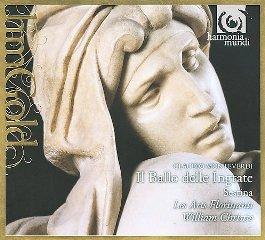Monteverdi - Il Ballo delle Ingrate • La Sestina (Christie) [1983]
Monteverdi - Il Ballo delle Ingrate • La Sestina (Christie) [1983]

1. Il Ballo Delle Ingrate: Ov 2. Il Ballo Delle Ingrate: Amore: 'De I'implacabil Dio' 3. Il Ballo Delle Ingrate: Sinf 4. Il Ballo Delle Ingrate: Venere: 'Udite, Donne, Udite' 5. Il Ballo Delle Ingrate: Plutone: 'Bella Madre D'amor' 6. Il Ballo Delle Ingrate: Amore E Venere: 'Ecco Ver Noi' 7. Il Ballo Delle Ingrate: Ballo 8. Il Ballo Delle Ingrate: Plutone: 'Dal Tenebroso Orror' 9. Il Ballo Delle Ingrate: Ballo 10. Il Ballo Delle Ingrate: Una Delle Ingrate: 'Ahi Troppo E Duro' 11. Sestina: Prima Parte: Incenerite Spoglie 12. Sestina: Seconda Parte: Ditelo Voi 13. Sestina: Terza Parte: Dara La Notte Il Sol 14. Sestina: Quarta Parte: Ma Te Raccoglie 15. Sestina: Quinta Parte: O Chiome D'or 16. Sestina: Sesta Et Ultima Parte: Dunque Amata Reliquie Jill Feldman - soprano Philippe Cantor - tenor Guillemette Laurens – mezzo-soprano Dominique Visse - countertenor William Christie – harpsichord Michel Laplénie - tenor Les Arts Florissants William Christie – conductor
Il ballo delle ingrate (The Ballo of the Ungrateful Ladies) is a semi-dramatic ballet (or ballo) by the Italian composer Claudio Monteverdi with words by Ottavio Rinuccini. It was first performed in Mantua on Wednesday 4 June 1608 as part of the wedding celebrations for Francesco Gonzaga (the son of Monteverdri's patron Duke Vincenzo of Mantua) and Margaret of Savoy. Both Vincenzo and Francesco Gonzaga took part in the dancing. Monteverdi also composed the opera L'Arianna (to another libretto by Rinuccini) and the music for the prologue to Guarini's play L'idropica for the occasion.
Monteverdi’s Sixth Book of Madrigals, which appeared nine years after his previous volume, was conceived as his final, though highly significant contribution to the stile antico. This was on the point of being consigned to history by the solo vocal style of the new musical form of opera and by the equally innovative concertato madrigal. Two masterpieces within Book Six show that the traditional five-part madrigal was still a force to be reckoned: the Sestina, Monteverdi’s heartrending tribute to his wife, who had died in 1607, and the Lamento d’Arianna, a polyphonic transcription of his best-known solo operatic piece. The 1623 solo version of the Lamento can also be heard on this CD, as well as twelve rarely performed madrigals published between 1593 and 1634.








